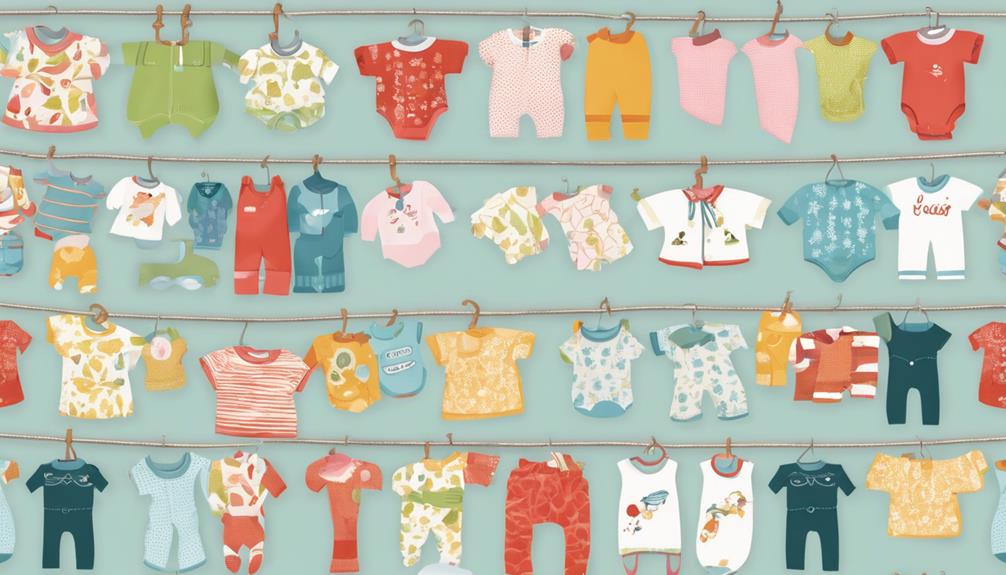As healthcare providers, we recognize that newborns are more vulnerable to infection, with studies showing they are especially prone in the initial days of life. It is crucial to have a thorough care plan in place to safeguard their health.
By addressing various factors such as hygiene practices, vaccination schedules, and tailored interventions, we can effectively manage and reduce the risk of infections in neonates.
Let's explore how creating a detailed care plan can greatly impact the well-being of these precious individuals.
Key Takeaways
- Tailoring care plans based on risk factors minimizes newborn infection risks.
- Implementing infection prevention strategies is crucial for newborn health.
- Early identification of signs and symptoms allows for prompt intervention.
- Collaborating with healthcare professionals ensures comprehensive and timely care.
Understanding Newborn Infection Risks
As healthcare providers, we recognize that newborns face heightened susceptibility to infections due to their underdeveloped immune systems and exposure to various pathogens. Newborns, especially those born prematurely or with low birth weight, are at a higher risk of infections that can lead to severe complications like sepsis. Understanding the signs of infection in newborns is important for early intervention and effective care. Monitoring the newborn's skin for any abnormalities, such as redness, warmth, or discharge, can indicate a possible infection. Additionally, keeping a close eye on the newborn's temperature is essential, as a fever or hypothermia could be an early sign of an underlying infection.
Care plans for newborns should include infection prevention strategies such as proper hand hygiene, maintaining a sterile environment, and limiting exposure to sick individuals. Regular assessments for any signs of infection, prompt treatment when necessary, and clear communication with parents are essential components of caring for a neonatal population at risk for infections.
Importance of Hygiene Practices

Proper hygiene practices are foundational in safeguarding newborns against infections by minimizing the transmission of harmful pathogens. When it comes to caring for newborns, ensuring a clean environment and sterilizing equipment are paramount in reducing the risk of infections.
Educating caregivers on proper hygiene techniques, such as thorough handwashing, can greatly decrease the transmission of pathogens to these vulnerable little ones. Additionally, regularly disinfecting high-touch surfaces in neonatal care settings is crucial for preventing the spread of infections among newborns.
Implementing strict infection control protocols, which include wearing gloves and using hand sanitizers, is essential in creating a safe environment for these delicate beings. By prioritizing hygiene practices, we can create a protective shield around newborns, keeping them safe from potential infections and allowing them to thrive in a healthy environment.
Vaccination Schedule Recommendations
Discussing the recommended vaccination schedule with healthcare providers is essential to guarantee newborns receive timely immunizations for best protection against infectious diseases. The CDC provides guidelines for newborn vaccination schedules, including important shots like Hepatitis B, DTaP, Hib, Polio, Rotavirus, and Pneumococcal vaccines. Following this schedule is critical as it helps build immunity early in life, safeguarding against serious illnesses.
Proper vaccination timing is key to ensuring newborns are shielded from various pathogens that can jeopardize their health. Healthcare providers play a critical role in educating parents about the significance of timely immunizations for their newborns. By adhering to the recommended vaccination schedule, parents can help protect their infants from a range of infectious diseases, setting them on a path towards a healthier future.
Prioritizing newborn vaccinations is a proactive approach to promoting overall well-being and safeguarding against potential health risks.
Creating a Comprehensive Care Plan

When establishing a thorough care plan for newborns, identifying risk factors and tailoring individualized strategies are key components in safeguarding against infections.
- Identify Risk Factors: Understanding the specific risk factors such as premature birth, maternal infections, and invasive medical procedures can help us create targeted care plans for each newborn.
- Implement Infection Prevention: By incorporating infection prevention strategies like hand hygiene, aseptic techniques, and isolation precautions, we can minimize the risk of infections in newborns.
- Monitor Signs and Symptoms: Closely monitoring newborns for signs and symptoms of infection such as fever, poor feeding, lethargy, and respiratory distress enables us to detect issues early and intervene promptly.
- Collaborate for Timely Care: Collaborating with healthcare team members ensures timely diagnosis, treatment, and follow-up care for newborns at risk for infections, promoting a thorough and effective care for these vulnerable patients.
Through a detailed and individualized approach that focuses on prevention, monitoring, and collaboration, we can provide the best possible care for newborns at risk of infections.
Promoting Newborn Health
Upon ensuring a thorough care plan for newborns, promoting newborn health becomes paramount in safeguarding against infections and fostering overall well-being. Implementing strict infection control measures like proper hand hygiene and aseptic techniques greatly reduces the risk of newborn infections.
Educating parents on vaccination schedules and hygiene practices is essential to shield newborns from potential infections. Monitoring newborns for signs of infection, such as fever, poor feeding, irritability, and skin color changes, enables prompt intervention if needed. Encouraging exclusive breastfeeding is vital as it boosts the baby's immune system, offering protection against infections.
Collaborating closely with healthcare providers allows for timely diagnosis and treatment of any suspected infections, which helps prevent complications. By prioritizing these strategies and staying vigilant, we can effectively promote newborn health and create a strong foundation for their well-being.
Frequently Asked Questions
What Nursing Diagnoses Are Newborns at Risk For?
We identify nursing diagnoses newborns are at risk for, such as Risk for Infection, Impaired Skin Integrity, and Risk for Altered Body Temperature. Early identification allows for preventive measures, promoting newborn health through effective care plans.
What Are the Nursing Goals for Risk of Infection?
We aim to prevent infection spread in newborns by implementing isolation when needed, educating on hygiene, monitoring signs for early detection, and collaborating for tailored care. Our focus is on maintaining a sterile, safe environment.
What Are the Risk for Infection Related to Birth Process?
We face infection risks during birth due to factors like prolonged rupture of membranes, maternal fever, and invasive procedures. Maternal infections can also pose threats. Close monitoring and early detection are vital for effective care plans.
What Are the Nursing Care Plan of Neonatal Sepsis?
We focus on maintaining body temperature, avoiding cold stress, and closely monitoring vital signs for neonatal sepsis. Our interventions include managing fever, administering antibiotics, providing fluid therapy, and monitoring clinical indicators to guarantee best care.
Conclusion
In conclusion, it's essential for healthcare professionals to prioritize newborn infection risk management through a thorough care plan.
While some may argue that implementing such a plan requires additional resources and time, the long-term benefits of promoting newborn health and preventing infections far outweigh any initial challenges.
By staying informed, proactive, and diligent in our approach, we can create a safe and supportive environment for newborns to thrive.









